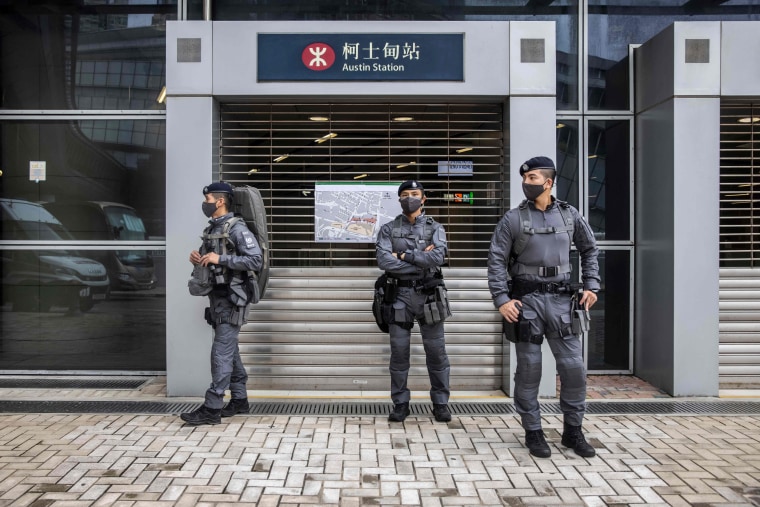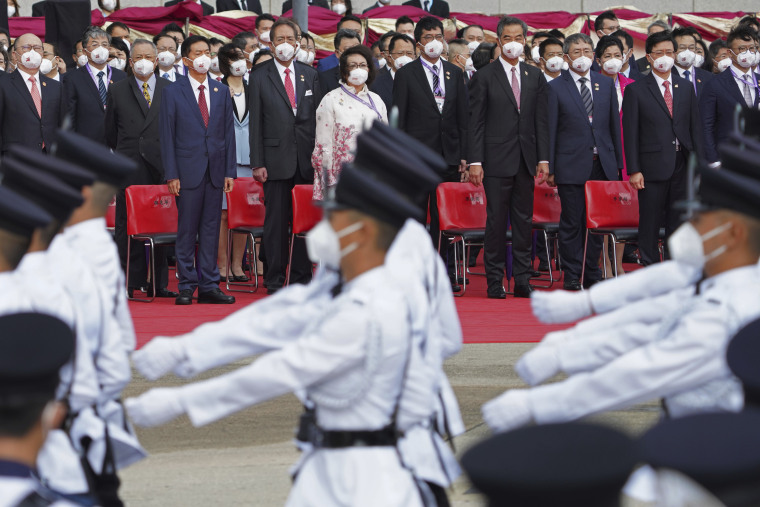HONG KONG — Chinese President Xi Jinping on Friday defended the “one country, two systems” form of governance in Hong Kong in a rare visit to the Chinese territory amid a deepening authoritarian crackdown by Beijing.
Xi was in Hong Kong to swear in its handpicked new leader, John Lee, as the former British colony marks 25 years since its return to Chinese rule. The trip, Xi’s first outside mainland China since January 2020, is widely seen as a victory lap in a once politically raucous city where even the smallest signs of dissent are now being stamped out.
“Having gone through ups and downs, people have learned the hard way that Hong Kong cannot be destabilized and cannot afford to seek chaos,” Xi said, avoiding any direct mention of the large-scale antigovernment protests that captured global attention for much of 2019.
Download the NBC News app for breaking news and politics
While the city must be run by “patriots,” Xi said, it must also maintain its unique status and strengths, including as an international financial, shipping and aviation hub. That status has been challenged during the coronavirus pandemic by “zero-Covid” restrictions that have kept Hong Kong and mainland China largely cut off from the world.
Xi said there was no reason to change the “one country, two systems” principle, which was designed to give Hong Kong a high degree of autonomy after the 1997 handover.
Critics say that autonomy, as well as the pre-handover political freedoms that Hong Kong residents were promised they could keep for the first 50 years under Chinese rule, has been gravely undermined under a national security law Beijing imposed in 2020.
“They will portray Hong Kong as a successful example of ‘one country, two systems,’” Nathan Law, a pro-democracy activist living in self-exile in Britain, said this week. “But for many Hong Kong people, including myself, all we can feel is a deep betrayal and also anger and sadness because we have never felt like Beijing respects our community and the promises they gave to us.”
Hong Kong has undergone seismic change since Xi’s last visit in 2017, when he warned against any challenge to Chinese sovereignty. Two years later, the city was convulsed by months of pro-democracy protests that sometimes turned violent, with some protesters calling for Hong Kong independence.
Beijing responded by imposing the national security law, saying it was necessary to restore order. Since then, almost 200 people have been arrested on charges of subversion, secession, terrorism or collusion with foreign forces, including journalists and many of Hong Kong’s most prominent pro-democracy figures. Multiple pro-democracy news outlets have shut down, and the local legislature now lacks any pro-democracy opposition.
The crackdown in Hong Kong has been widely condemned internationally, with U.S. Secretary of State Antony Blinken calling on Thursday for Hong Kongers’ “promised freedoms to be reinstated.”

Defenders of the government’s actions say national security considerations sometimes affect rights and freedoms, just as in Western countries. Regina Ip, a pro-Beijing lawmaker who is the convener of Lee’s Executive Council, said Hong Kong still has judicial, financial and other systems distinct from those on the mainland but that it needed a “reset” after the protests of 2019.
“It is important to remember that our separate systems are only sustainable if we do not do harm to the country,” she told NBC News this week. “It’s only sustainable if Hong Kong accepts China’s sovereignty, upholds China’s security and developmental interests.”
Police were out in force for Xi’s visit to the city of 7.4 million, where posters celebrating the 25th anniversary of the handover declare a “new era” of stability. Media coverage of the anniversary events, which had already excluded multiple outlets, was further restricted this week when at least 10 journalists applying to cover them for local and international media were rejected for “security reasons.”
Thousands of guests and staff members were required to take daily coronavirus tests and enter hotel quarantine ahead of the events, in line with Covid-19 restrictions. Hong Kong, which had its worst outbreak of the pandemic this spring, is experiencing another uptick in cases, reporting 2,358 on Thursday.
Rather than stay in Hong Kong during his two-day visit, Xi spent the night across the mainland border in the city of Shenzhen. He was expected to leave soon after the inauguration.
Friday began with a flag-raising ceremony at Golden Bauhinia Square on Victoria Harbor, amid strong winds and a typhoon warning. It was the second year Hong Kong police at the ceremony used mainland China’s “goose-stepping” style, which on Friday was extended to the entire police force, replacing the British-style marching used in colonial times.
Later, at a socially distanced ceremony in which officials wore masks emblazoned with “25,” Xi swore in Lee, the only candidate in a May election decided by a committee made up of fewer than 1,500 mostly pro-Beijing members. Lee, who was Hong Kong’s security secretary during the 2019 protests, is among several top Hong Kong officials sanctioned by the U.S. over their roles in implementing the national security law.
Lee also praised “one country, two systems,” and said he would “strive to build a more caring and more inclusive Hong Kong full of vibrancy, hope and development opportunities.”

Unlike in 2017, when tens of thousands of demonstrators marched during Xi’s visit in an annual July 1 tradition that dated back to the handover, the streets were quiet with scattered civilians, some carrying multiple Chinese flags and wearing red masks in a patriotic fervor.
The League of Social Democrats, a pro-democracy group, said this week that it would refrain from holding any protests on Friday after some of its volunteers were summoned for meetings with the national security police.
Security barriers blocked all roads near the convention center, where the inauguration was held, and police fought against the heavy wind as they tried to fasten blockades on footbridges.
Police officers randomly stopped and searched pedestrians taking photos from footbridges and asked them for press credentials. Asked whether it was illegal to spectate, one officer replied, “I don’t know.”
Ip said concerns that the national security law had eroded Hong Kongers’ rights and freedoms were “only a matter of perception.”
“Only those people who might have been involved in unlawful activities undermining national security have reasons for concern,” she said. “The rest of the community, I think we are very happy that law and order have been restored.”
Unlike past Hong Kong leaders who came up through the civil service, Lee was a career police officer, and he is expected to take a hard line on security. He has said one of his top priorities will be enacting local national security legislation known as Article 23.
“It seems that the government restrictions of people’s free expressions and political freedoms will be further enhanced,” said Eric Lai, the Hong Kong law fellow at the Georgetown Center for Asian Law. “And it also means the city’s human rights protections and the city’s rule of law will be further eroded.”
Ip said the national security law was imposed because Hong Kong failed to enact the Article 23 legislation as required by the Basic Law, its mini-constitution since the 1997 handover.
The national security law “only affects people with real criminal intent to overthrow the existing regime or to break Hong Kong away from the country or to undertake local terrorist activities, or to collude with foreign forces to harm China and Hong Kong,” she said. “So I think the great majority don’t need to worry.”
But activists, lawyers and others say the law leaves it unclear where the “red lines” are, giving rise to self-censorship and an atmosphere of uncertainty.
The crackdown has driven many of Hong Kong’s activists, artists, academics, lawyers and others to move abroad. Law, 28, said activist friends who stayed behind are struggling with depression and feelings of suffocation amid the shifting political landscape but are still trying to do what they can while treading carefully.
He said it was important to remind the international community that the story of Hong Kong is not over.
“Safeguarding Hong Kong is safeguarding the front lines of democracy, the front lines of the battle against the rise of authoritarianism and authoritarian expansion,” he said. “I think this case should be remembered, and we should definitely continue to pay attention to it.”
